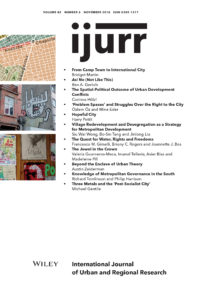The practices of metropolitan governance in the South are normalized and legitimized through the workings of a ‘knowledge market’ that has evolved at an extraordinary juncture between geopolitical and technological transformations. This essay describes the packaging and management of knowledge since the early 1990s, a period which has seen increasing references to concepts such as ‘public–private partnerships’, ‘new public management’ (NPM), ‘metropolitan governance’ and ‘best practice’. It explains the shift in terms of the coinciding dissolution of the Soviet Union in 1991, which removed the brakes on ‘neoliberal policy programmes’, and the practicability of using the web for knowledge management. Accompanying the ‘metropolitan renaissance’ since the early 1990s, NPM theory provided support for private sector‐style management of formerly public services and the claimed ‘global trend’ of decentralization of those services. The essay subsequently explains how, since the early 2000s, knowledge exchange relevant to metros in the South has also arisen from participation in transnational municipal networks (TMNs). Knowledge exchange has become more geographically complex, including learning across sites in the South. A policy discourse once dominated by global agencies and national governments now primarily takes the form of global agency knowledge transfer via the web and participation in TMNs.
Details
Written by:
Richard Tomlinson & Philip Harrison
Digital Object Identifier (DOI)
10.1111/1468-2427.12658
About DOI

